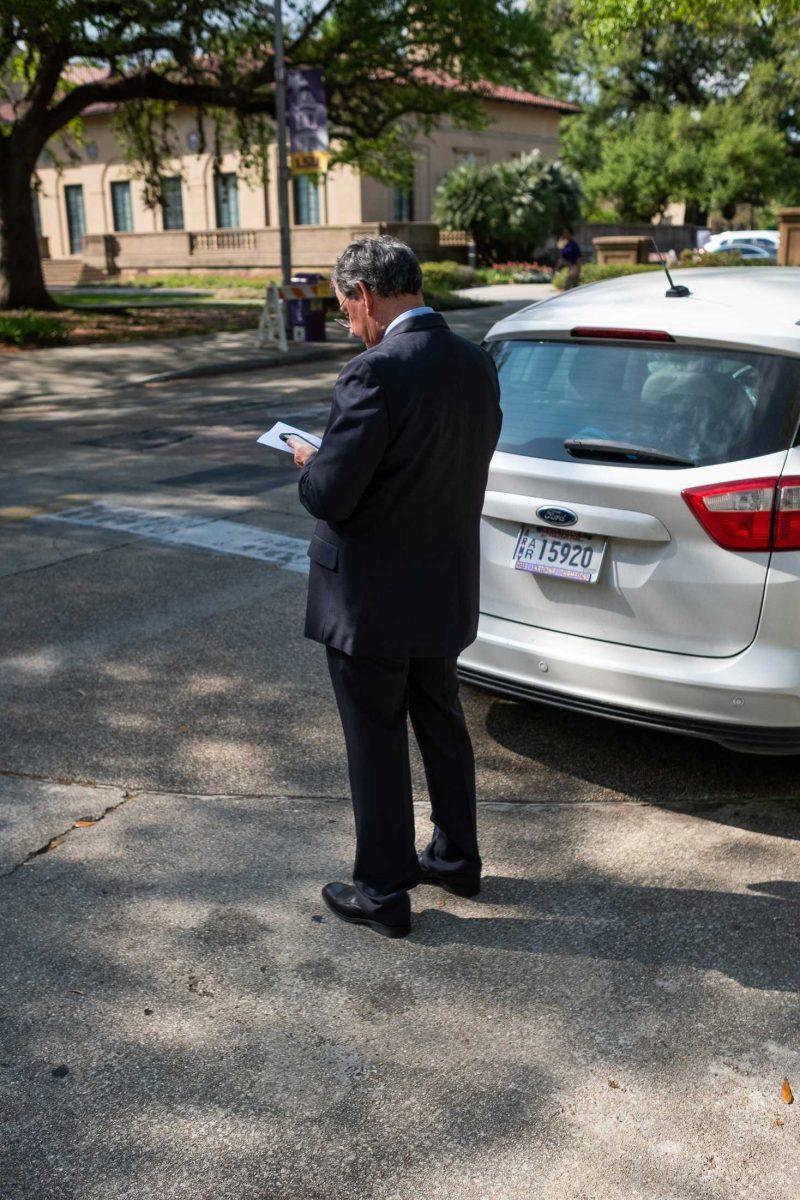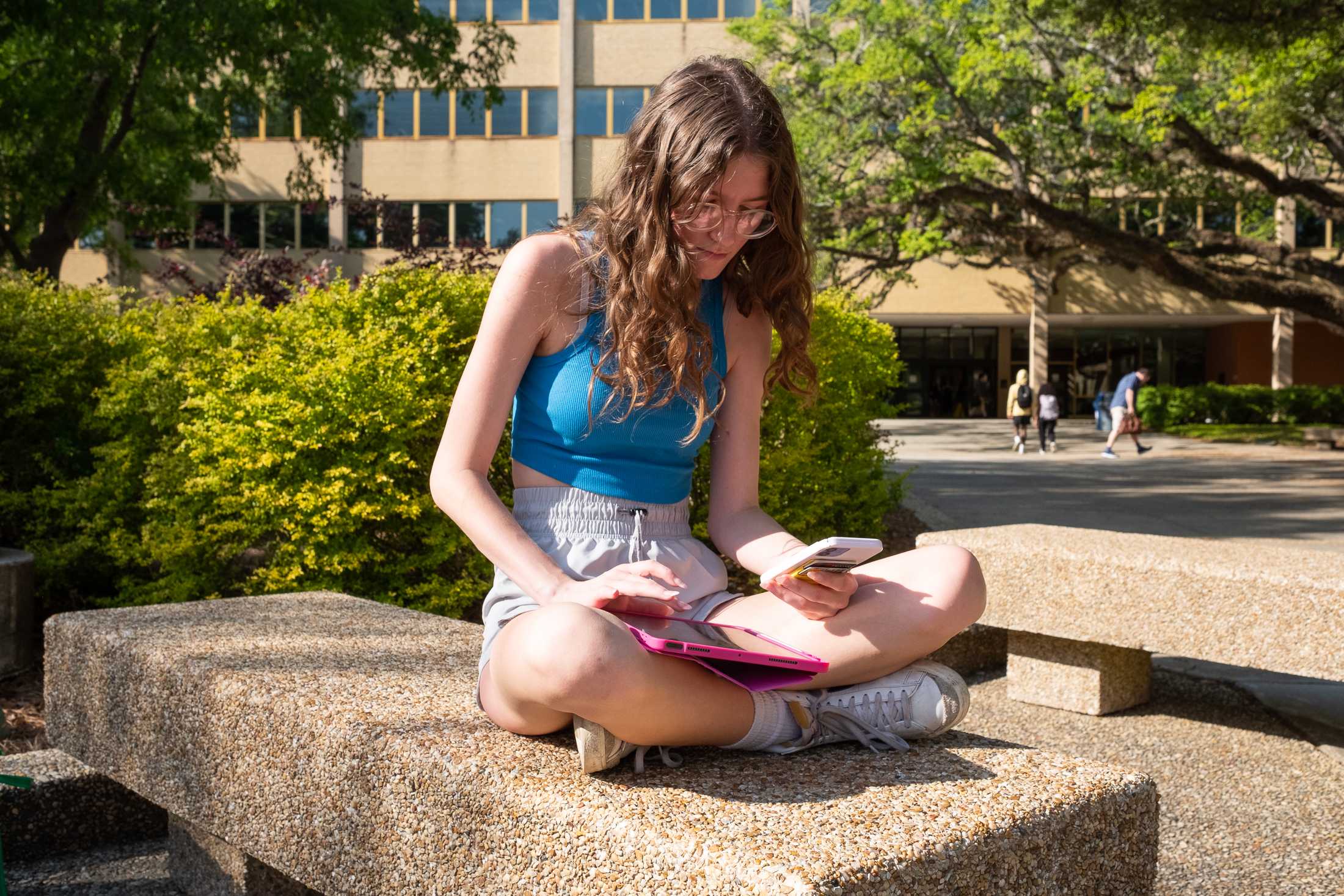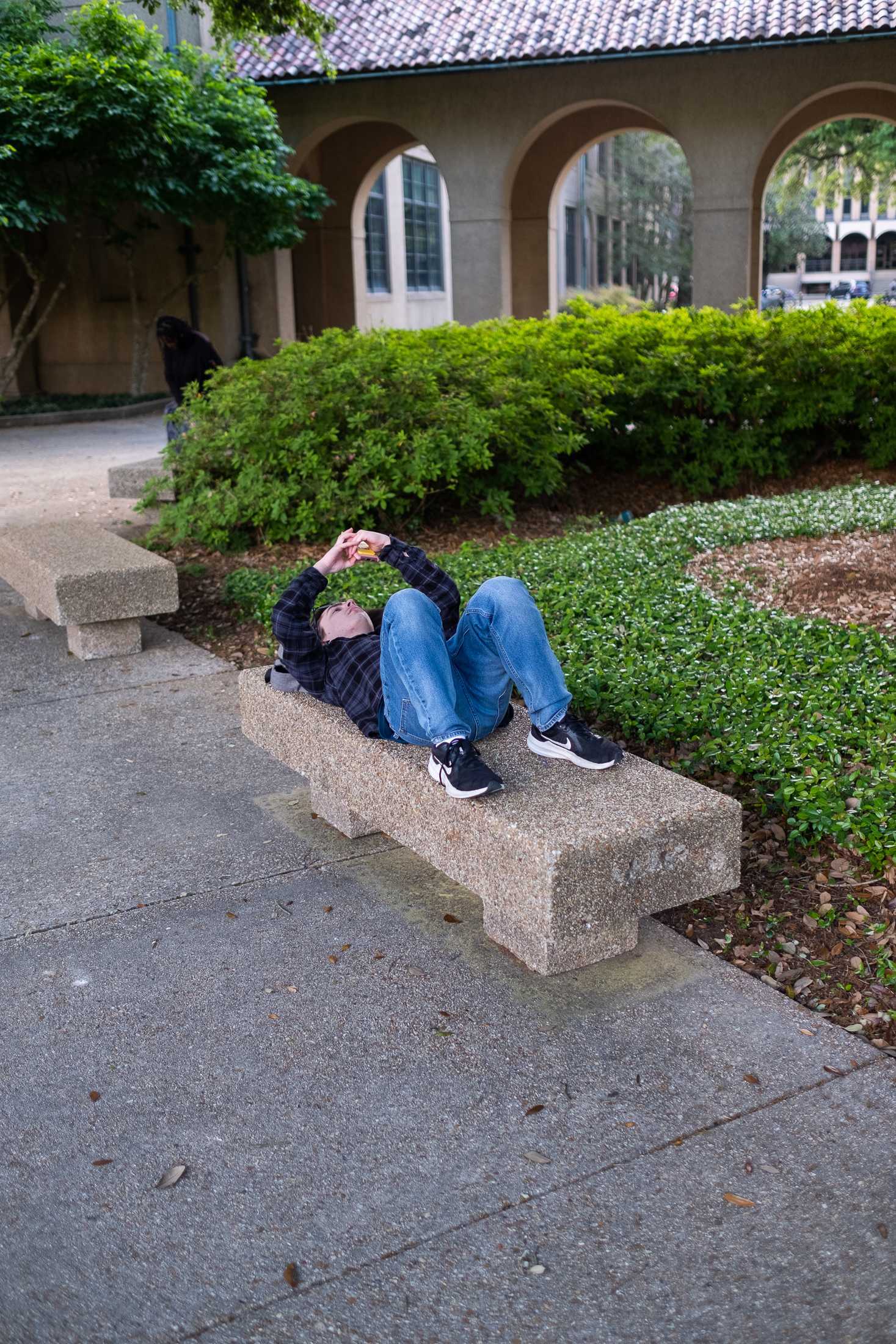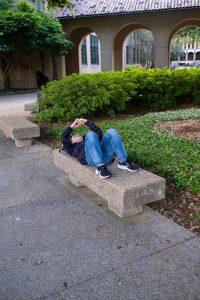Take a look around LSU’s campus on any given day at any given time, and you’ll see students walking to class, sitting on benches, sprawled out on the grass in the shade. Look closer, and you’ll notice that nearly every one of them is on their phone.
To live in the year 2023 is to be more or less constantly, electronically connected. A little over 10 years ago, only 35% of Americans owned a smartphone, according to the Pew Research Center. Today, that figure’s approaching 90%, and for college-age adults, it’s 96%.
Not only do we have smartphones, but we use them. A lot.
The average American spent over two hours on social media each and every day in 2022, according to market and consumer data supplier Statista.
Some students at LSU put that figure to shame.
“I would say, ballpark, probably four to five hours a day,” said psychology junior Bry Morse. “Mainly TikTok and Snapchat.”
For Morse, social media is a source of conveniently dosed enjoyment.
“It makes me a little happier,” she said. “If I need a pick-me-up, I can tend to find videos that make me laugh. It makes me feel good to send videos to my friends that I think they’ll like.”
But from time to time, Morse also considers deleting her social media.
“I have before, and it was really hard. I found that I was a lot more bored than I thought I would be, and I was like ‘oh my gosh, I have a dependance, no!’ But now I have time-locks on my apps,” Morse said. “On TikTok specifically, after 90 minutes, it’ll ask me for a password to continue, but I force myself to shut it down.”
Many LSU students struggle with managing their time on social media.
“It’s very addicting,” said dental hygiene freshman Taylor Stryzewski, “I have a hard time using my free time in other ways.”
In fact, Strzyzewski struggled to pin down exactly how many hours she spent on social media each week because the number was so high.
“I’m trying to do the math in my head,” she said. “Maybe about 200?”
There are only 168 hours in a week.
Stryzewski said although she spends about half of all her time on social media, she’d never considered taking a break from the apps. “I do learn a lot from the things I see,” she added.
When asked how much time she spent on social media, biology freshman Katie Shannon responded simply, “Way too much.”
But apps like Messages and Snapchat are how she stays in touch with friends and family.
“It connects me to more of my peers, and I get to see what’s going on on campus. Also, I’m so far away from home, I’m from Chicago, so I get to see updates from back home, and also what my friends are doing at their schools,” Shannon said.
Even so, spending large amounts of time online can have deleterious effects.
“I think it shortens attention spans and people just have less patience,” said Shannon, who had just written a paper on the topic for her English class.
As a habit, long hours on social media can “aggravate mental health issues,” according to a systematic review of several research papers conducted by psychologists from the California Institute of Behavioral Neurosciences and Psychology.
They hypothesize social media negatively impacts mental health because it displaces other, more beneficial forms of social interaction. This phenomenon is known as the “Displaced Behavior Theory.”
The study also gives credence to the premise that idealized depictions on social media negatively affect self-esteem and even our esteem for others.
After deleting his social media several months ago, math statistics and political science freshman Steven Moore began to notice a change.
“100% I view my friends in a much better light because I’m not always seeing them in my feed,” Moore said. “I don’t need to know the in-depths of their everyday life and what they’re posting on their stories.”
When he transitioned from high school to college, Moore decided to get rid of his Instagram, Snapchat and “pretty much everything,” he said.
“I was spending too much time on it—that’s the reason I tell people, but I broke up with my ex and it just made me remember them,” Moore said. “All my posts were about them.”
Social media can preserve both fond memories and times we’d rather forget.
Still, Moore finds himself tempted to redownload the apps “all the time,” he said. “What’s the term? FOMO? You always feel like you’re missing a conversation with your friends.”
In a world where social media has become deeply entwined with almost all our social interactions, it’s difficult to quit without feeling you’ve lost something—especially when everyone around you is still tuned in.
Some find their life improved without social media.
Biochemistry sophomore Michael Melancon opted to unplug for Lent, and a month in, he’s already noticed a positive change.
“This has definitely been my best semester academically,” Melancon said. “So many times, I’d get done with classes and be like, ‘Alright, now I’m going to get on YouTube or Twitter or something.’ But now it’s not there, so I have the time to study, and also, I find it easier to focus without wanting to go onto social media. . .Definitely it’s been better not having it.”
Social media can be addictive, distracting and, at times, all consuming. A frequent time-suck, the apps often displace hours better spent with friends or on school work. Yet, because they connect us with peers and family, because they provide neat packages of entertainment, inspiration and knowledge, we continue to sign up, sign on and scroll down.
For the students of LSU, social media presents a trade-off. Plug in and you’ll see your friends more frequently, be less bored and more entertained—but the time spent can turn quickly to time wasted. On the other hand, tuning out frees up hours for other (perhaps much better) things—yet comes at the cost of connectivity.
Love it or hate it, social media is here to stay. As with so many innovations, the platforms have become both a modern problem and a modern solution.
Will we learn to control our time on them or be controlled by them? The answer is up to you.










